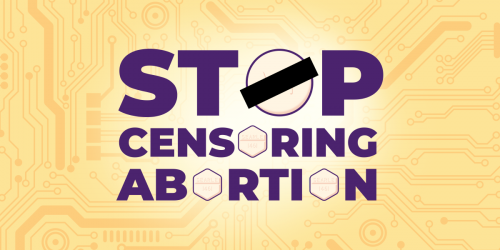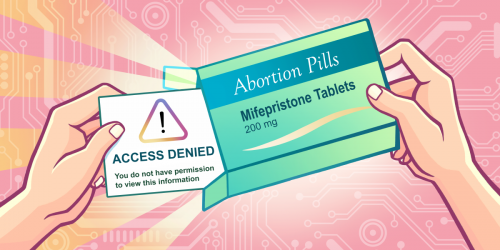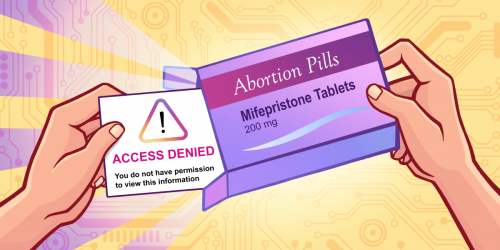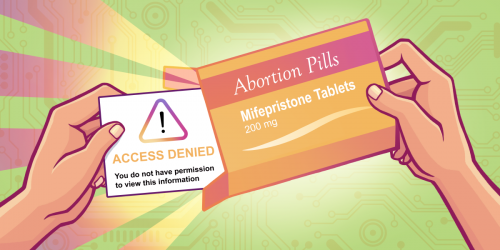BY LISA FEMIA | September 30, 2025
This is the seventh installment in a blog series documenting EFF's findings from the Stop Censoring Abortion campaign. You can read additional posts here.
For users hoping to promote or boost an abortion-related post on Meta platforms, the Community Standards are just step one. While the Community Standards apply to all posts, paid posts and advertisements must also comply with Meta's Advertising Standards. It’s easy to understand why Meta places extra requirements on paid content. In fact, their “advertising policy principles” outline several important and laudable goals, including promoting transparency and protecting users from scams, fraud, and unsafe and discriminatory practices.
But additional standards bring additional content moderation, and with that comes increased potential for user confusion and moderation errors. Meta’s ad policies, like its enforcement policies, are vague on a number of important questions. Because of this, it’s no surprise that Meta's ad policies repeatedly came up as we reviewed our Stop Censoring Abortion submissions.
There are two important things to understand about these ad policies. First, the ad policies do indeed impose stricter rules on content about abortion—and specifically medication abortion—than Meta’s Community Standards do. To help users better understand what is and isn’t allowed, we took a closer look at the policies and what Meta has said about them.
Second, despite these requirements, the ad policies do not categorically block abortion-related posts from being promoted as ads. In other words, while Meta’s ad policies introduce extra hurdles, they should not, in theory, be a complete barrier to promoting abortion-related posts as boosted content. Still, our analysis revealed that Meta is falling short in several areas.
What’s Allowed Under the Drugs and Pharmaceuticals Policy?
When EFF asked Meta about potential ad policy violations, the company first pointed to its Drugs and Pharmaceuticals policy. In the abortion care context, this policy applies to paid content specifically about medication abortion and use of abortion pills. Ads promoting these and other prescription drugs are permitted, but there are additional requirements:
- To reduce risks to consumers, Meta requires advertisers to prove they’re appropriately licensed and get prior authorization from Meta.
- Authorization is limited to online pharmacies, telehealth providers, and pharmaceutical manufacturers.
- The ads also must only target people 18 and older, and only in the countries in which the user is licensed.
Understanding what counts as “promoting prescription drugs” is where things get murky. Crucially, the written policy states that advertisers do not need authorization to run ads that “educate, advocate or give public service announcements related to prescription drugs” or that “promote telehealth services generally.” This should, in theory, leave a critical opening for abortion advocates focused on education and advocacy rather than direct prescription drug sales.
But Meta told EFF that advertisers “must obtain authorization to post ads discussing medical efficacy, legality, accessibility, affordability, and scientific merits and restrict these ads to adults aged 18 or older.” Yet many of these topics—medical efficacy, legality, accessibility—are precisely what educational content and advocacy often address. Where’s the line? This vagueness makes it difficult for abortion pill advocates to understand what’s actually permitted.
What’s Allowed Under the Social Issues Policy?
Meta also told EFF that its Ads about Social Issues, Elections or Politics policy may apply to a range of abortion-related content. Under this policy, advertisers within certain countries—including the U.S.—must meet several requirements before running ads about certain “social issues.” Requirements include:
- Completing Meta’s social issues authorization process;
- Including a verified "Paid for by" disclaimer on the ad; and
- Complying with all applicable laws and regulations.
While certain news publishers are exempt from the policy, it otherwise applies to a wide range of accounts, including activists, brands, non-profit groups and political organizations.
Meta defines “social issues” as “sensitive topics that are heavily debated, may influence the outcome of an election or result in/relate to existing or proposed legislation.” What falls under this definition differs by country, and Meta provides country-specific topics lists and examples. In the U.S. and several other countries, ads that include “discussion, debate, or advocacy for or against...abortion services and pro-choice/pro-life advocacy” qualify as social issues ads under the “Civil and Social Rights” category.
Confusingly, Meta differentiates this from ads that primarily sell a product or promote a service, which do not require authorization or disclaimers, even if the ad secondarily includes advocacy for an issue. For instance, according to Meta's examples, an ad that says, “How can we address systemic racism?” counts as a social issues ad and requires authorization and disclaimers. On the other hand, an ad that says, “We have over 100 newly-published books about systemic racism and Black History now on sale” primarily promotes a product, and would not require authorization and disclaimers. But even with Meta's examples, the line is still blurry. This vagueness invites confusion and content moderation errors.
What About the Health and Wellness Policy?
Oddly, Meta never specifically identified its Health and Wellness ad policy to EFF, though the policy is directly relevant to abortion-related paid content. This policy addresses ads about reproductive health and family planning services, and requires ads regarding “abortion medical consultation and related services” to be targeted at users 18 and older. It also expressly states that for paid content involving “[r]eproductive health and wellness drugs or treatments that require prescription,” accounts must comply with both this policy and the Drugs and Pharmaceuticals policy.
This means abortion advocates must navigate the Drugs and Pharmaceuticals policy, the Social Issues policy, and the Health and Wellness policy—each with its own requirements and authorization processes. That Meta didn’t mention this highly relevant policy when asked about abortion advertising underscores how confusingly dispersed these rules are.
Like the Drugs policy, the Health and Wellness policy contains an important education exception for abortion advocates: The age-targeting requirements do not apply to “[e]ducational material or information about family planning services without any direct promotion or facilitation of the services.”
When Content Moderation Makes Mistakes
Meta's complex policies create fertile ground for automated moderation errors. Our Stop Censoring Abortion survey submissions revealed that Meta's systems repeatedly misidentified educational abortion content as Community Standards violations. The same over-moderation problems are also a risk in the advertising context.
On top of that, content moderation errors even on unpaid posts can trigger advertising restrictions and penalties. Meta's advertising restrictions policy states that Community Standards violations can result in restricted advertising features or complete advertising bans. This creates a compounding problem when educational content about abortion is wrongly flagged. Abortion advocates could face a double penalty: first their content is removed, then their ability to advertise is restricted.
This may be, in part, what happened to Red River Women's Clinic, a Minnesota abortion clinic we wrote about earlier in this series. When its account was incorrectly suspended for violating the “Community Standards on drugs,” the clinic appealed and eventually reached out to a contact at Meta. When Meta finally removed the incorrect flag and restored the account, Red River received a message informing them they were no longer out of compliance with the advertising restrictions policy.
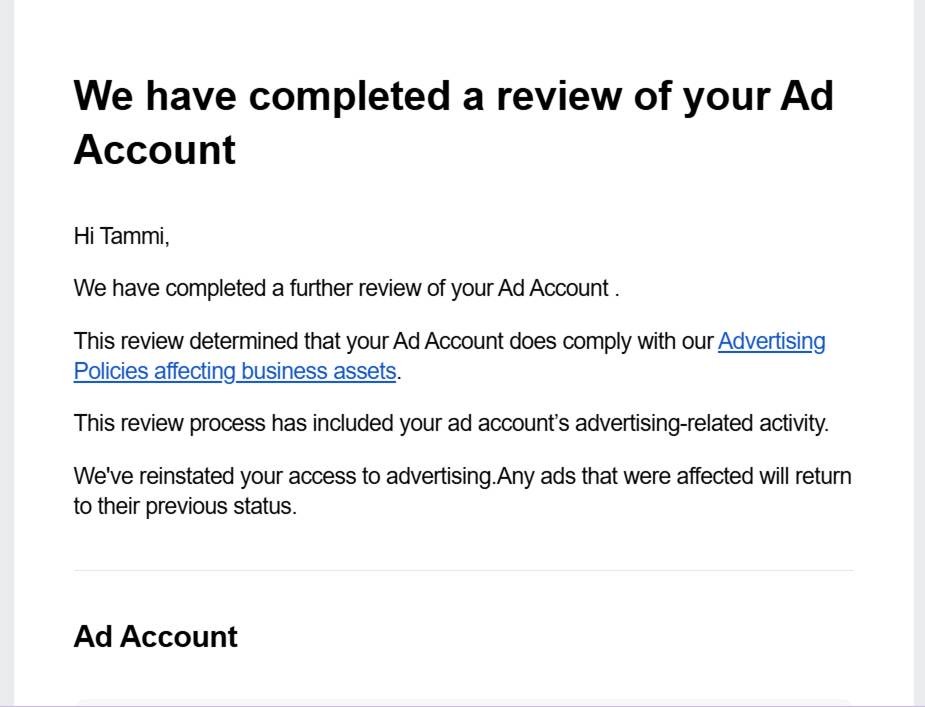
Screenshot submitted by Red River Women's Clinic to EFF
How Meta Can Improve
Our review of the ad policies and survey submissions showed that there is room for improvement in how Meta handles abortion-related advertising.
First, Meta should clarify what is permitted without prior authorization under the Drugs and Pharmaceuticals policy. As noted above, the policies say advertisers do not need authorization to “educate, advocate or give public service announcements,” but Meta told EFF authorization is needed to promote posts discussing “medical efficacy, legality, accessibility, affordability, and scientific merits.” Users should be able to more easily determine what content falls on each side of that line.
Second, Meta should clarify when its Social Issues policy applies. Does discussing abortion at all trigger its application? Meta says the policy excludes posts primarily advertising a service, yet this is not what survey respondent Lynsey Bourke experienced. She runs the Instagram account Rouge Doulas, a global abortion support collective and doula training school. Rouge Doulas had a paid post removed under this very policy for advertising something that is clearly a service: its doula training program called “Rouge Abortion Doula School.” The policy’s current ambiguity makes it difficult for advocates to create compliant content with confidence.
Third, and as EFF has previously argued, Meta should ensure its automated system is not over-moderating. Meta must also provide a meaningful appeals process for when errors inevitably occur. Automated systems are blunt tools and are bound to make mistakes on complex topics like abortion. But simply using an image of a pill on an educational post shouldn’t automatically trigger takedowns. Improving automated moderation will help correct the cascading effect of incorrect Community Standards flags triggering advertising restrictions.
With clearer policies, better moderation, and a commitment to transparency, Meta can make it easier for accounts to share and boost vital reproductive health information.
This is the seventh post in our blog series documenting the findings from our Stop Censoring Abortion campaign. Read more at https://www.eff.org/pages/stop-censoring-abortion
Affected by unjust censorship? Share your story using the hashtag #StopCensoringAbortion. Amplify censored posts and accounts, share screenshots of removals and platform messages—together, we can demonstrate how these policies harm real people.



